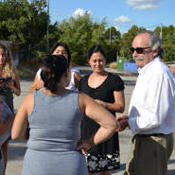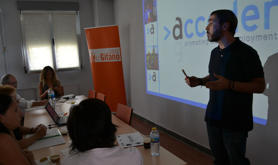24/09/2014
International Department

A delegation of the European Economic and Social Committee (EESC) this afternoon visited the headquarters of FSG in Madrid to know the operation of the programs of employment (Acceder), education (Promociona) and housing that the organization is developing as well as for the intervention project in La Cañada Real.
EESC members (Anne-Marie Sigmund, Austria, Luis Miguel Pariza, Spain and Madi Sharma, UK) were able to deepen the main lines of the work of the FSG to combat social exclusion and achieve better life conditions for the Roma community. What resources are used and how to enable Roma children completing secondary? How relocation processes are supported? What steps are taken to ensure jobs for young Roma? How to involve families? Or why do we believe in social promotion to fight poverty?
They have deepened in the Acceder program which aims that the Roma population enter the job market. It was started fourteen years ago and has maintained a strategy that has evolved over the years: The commitment to training, adapting to the needs of the Roma community, corporate partnerships and cooperation with institutions and administrations, are part their success. More than 76,400 people have participated and 20,900 people at risk of exclusion got employed in these years.
Also, they have known the ins and outs of the educational program Promociona, which aims to get more and more Roma boys and girls completing secondary and continue their training. In the last school year attended by more than 1,100 students and 353 schools.
Employment, education and housing are three of the priority areas of work of the FSG, essential for the inclusion of the Roma population.
Within his busy schedule, the delegation visited the Ministry of Health to know the National Roma Integration Strategy in Spain. Then, they also had a subsequent meeting with the Permanent Commission of the Roma State Council. The afternoon was dedicated to a visit to the headquarters of the FSG and then The Cañada Real to know directly the work in situations of exclusion.
The next day, they moved to Seville to meet with public institutions and other NGOs.
What is the European Economic and Social Committee?
The European Economic and Social Committee (EESC) is a consultative body of the European Union (EU), which offers a specialized advice to the European institutions (European Commission, EU Council, European Parliament). This work is done through opinions focused on legislative proposals or issues considered interesting.
It recently set up a working group on the topic: "For a better inclusion of the Roma community through organized civil society." The objective is to promote greater participation of civil society as a means to enhance social inclusion. The project aims to highlight the impact of legislation, programs and policies of the EU; establish effective instruments to involve organizations as a means to improve the social inclusion of the Roma community.
In addition to Spain, the delegation will visit Romania, Bulgaria and Finland.

Links